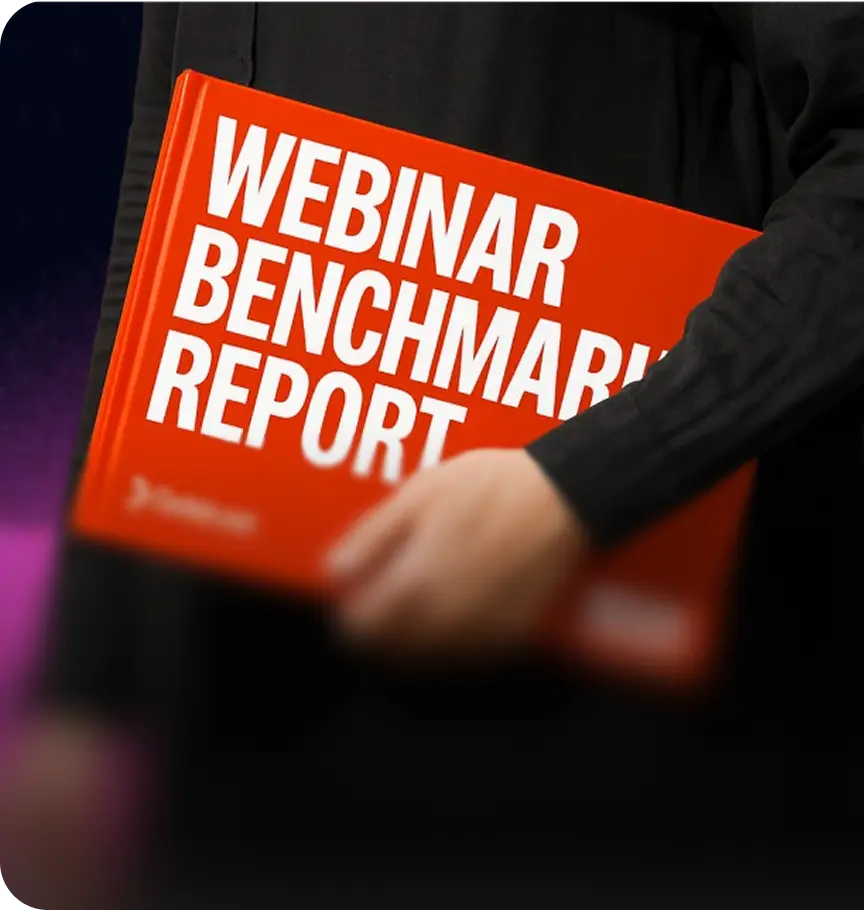The Complete Guide to Planning an Event Series
Table of Contents
Maximize Your Marketing ROI
Join 10,000 other marketers already getting the best tips on running engaging events that boost pipeline and create raving fans.
Once you have a few successful virtual events under your belt, what’s next for your event marketing strategy? If you’re ready to go bigger with your events and your ROI, an event series could be your next move.
A great series can set you apart from the pack, expand your reach, and engage your audiences throughout the customer journey. But planning and executing a series presents some unique challenges compared to a one-off event:
- Maintaining consistency while adapting to feedback
- Keeping attendees engaged and coming back
- Managing more speakers and content
In this guide, we’ll cover how to face these challenges with confidence so you can launch your own fantastic event series.
Best practices to plan an event series
- Set your event goals
- Find your theme, and plan how it will progress
- Build your team
- Choose your format and platform
- Set your budget
- Build your schedule
- Secure partnerships and sponsorships
- Find your speakers
- Promote your series
- Put your run of show together
Hear from the experts on how to grow your audience and bring in revenue with a flawlessly-executed series. Check out our four-part Masterclass: How to Create, Launch & Grow an Event Series!

What is an event series?
An event series is a sequence of related sessions. The common thread could be the topic, the guests, the target audience—the important thing is that the series has a theme.
An event series is a big-picture brand play. It differentiates your business and sets a foundation for full-funnel campaigns and promotions. It can also help you stand out in a saturated market by giving you a reason to engage your audiences on a regular basis.
Side by side: Single event vs. series
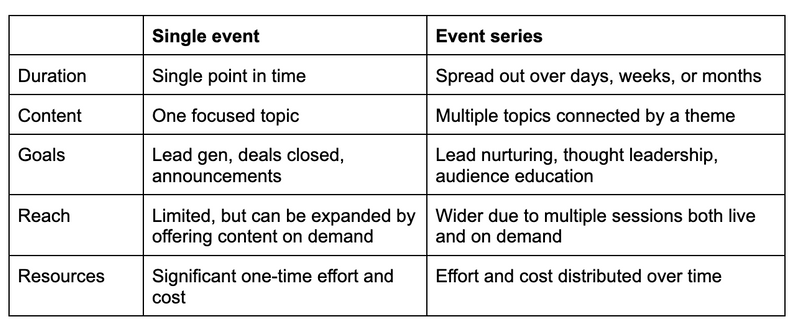
10 steps to plan a phenomenal event series
Ready to get started planning your series? Here are 10 steps to success.
1. Set your event goals
Setting event goals is a crucial first step in event management. When you’re embarking on a series, it’s especially important to nail down exactly what you hope to achieve with all your effort.
Ask questions like:
- Why do I want to plan this event series?
- How will I know the series is successful?
- Which metrics will resonate with senior leadership?
For any event, we’re dealing with two sets of measurable goals: business goals and audience goals. Let’s take a closer look at each.
Business goals of an event series
What business results do you hope to accomplish with your series? Whether you’re launching a new product, generating leads, or driving brand awareness, it’s important to know the answer to this question at the outset.
📊 Metrics to consider:
- Brand awareness
- Lead generation
- Demos
- Revenue
- Renewals
Audience goals of an event series
When you think of goal setting, you probably think of business goals first. But since the point of a series is to keep attendees coming back for more, you must also think of your audience. What do you want them to get out of your events?
📊 Metrics to consider:
- Engagement
- Satisfaction
- Repeat attendance
You know you’re on the right track when these two sets of goals align. You can track most of these metrics in your event platform’s analytics dashboard, but we also recommend sending out a post-event survey to gauge attendee experience and satisfaction.

2. Find your theme, and plan how it will progress
Every event series has a unifying theme based on the audience, products, industry trends, or another central motif. The key to planning a wildly successful series is to identify this theme early on and stick to it.
For instance, we've integrated the theme of donuts into every part of our series for demand generation marketers, called Donuts & Demand.

An event series can include just a few sessions, or it can be an ongoing series that lasts as long as it’s helpful. Once you identify your theme, you’ll start to get a sense of how long your series should be and, if it’s finite, how it will culminate and end.
👀Want to see an example? Check out our ongoing series, Donuts & Demand, to see how we’ve woven together donuts and demand generation as our central event theme.
3. Build your team
At many organizations, events are owned by marketing. Your series might be hyper-focused on one phase of your customer journey, or it might tie in throughout, from demand gen to customer marketing.
Pulling off a successful event also often involves teams outside marketing depending on the theme and goals. Identify which of these colleagues will be critical to your success.
Often, we see key stakeholders like sales and customer experience pulled into the event planning process during the very first step, goal setting. We love this approach because it helps ensure alignment from the beginning and gets you the buy-in you need from internal partners.
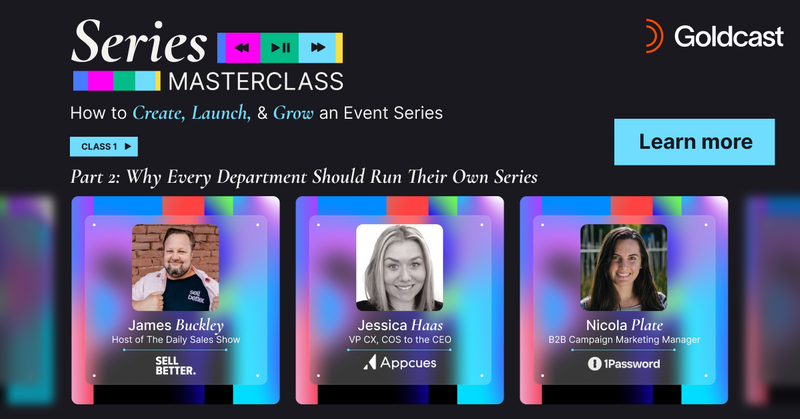
4. Choose your format and platform
Your event series could be virtual, in-person, or hybrid. Each type of event comes with pros and cons. Virtual events offer better reach, accessibility, and ROI. On the other hand, in-person events excel in networking and the general ‘wow’ factor. Done right, hybrid events can get you the best of both worlds.
No matter your format, you’ll need an event platform that checks all the boxes in terms of functionality. Here are a few key features to look for:
- High-quality video production features
- Multiple attendee engagement features (video Q&A, 1:1 chat, live polls, and more)
- Strong tech support and specs
- Customizable branding (landing page, emails, and more)
- Event analytics
- Key platform integrations
Choosing the right platform also helps you get more mileage from your events by repurposing content for multiple channels and extending reach with an on-demand content library.
5. Set your budget
Once you know the scope and format of your series, you’ll start to get an idea of the budget involved. If you’re planning a four-part series, your budget will look different from an ongoing quarterly series that will continue on an indefinite basis.
Of course, a virtual event budget will also look different from one for a hybrid event with an on-site element.
6. Build your schedule
When you’re bursting with great ideas, it’s easy to jump the gun and pack too much into one session, or schedule several sessions back-to-back.
However, we suggest spacing events out over weeks or months to maintain momentum and avoid burning your audience out.
Other scheduling tips:
- Avoid overlapping with holidays and large industry events
- Allow enough time for promotion between events
- It’s ok to adjust the timing sequence if needed, but try to be as consistent as possible
For our Event Series Masterclass, we held two sessions per month for a total of four limited sessions—making sure to avoid the week of Thanksgiving for our US-based attendees!
7. Secure partnerships and sponsorships
Securing partners and sponsors can be a lot of work for a single webinar. But for an event series, the ROI potential is greater for both you and your event partners. Repeated exposure to the same targeted audience is often enticing for sponsors.
Here are some ideas for sponsorship opportunities:
- Sponsor specific sessions with logo displayed and/or video played beforehand
- Sponsor booths with 1:1 chat opportunities
- Social media promotions across the event series
- Allowing attendees to opt-in to having their info shared with sponsors
- Physical swag boxes mailed to attendees with sponsor items
Create a sponsorship prospectus outlining the different options and benefits, and start contacting potential sponsors early.
8. Find your speakers
You probably chose your series theme based on your own industry—so you likely have plenty of subject matter experts within your own organization. Involving these SMEs in the planning process ensures your next event content is aligned with their areas of expertise.
Bringing in SMEs from outside your organization is an excellent collaboration opportunity that increases credibility for your brand and awareness for partners. Plus, recognizable keynote speakers can exponentially increase your registrations.
💡Want to learn how to source speakers for a new series? Get tips from three marketers who have each ran an ongoing series for years! Watch the episode How to Keep a Series Growing & Thriving of our Series Masterclass now to learn all about sourcing speakers and handling speaker outreach.
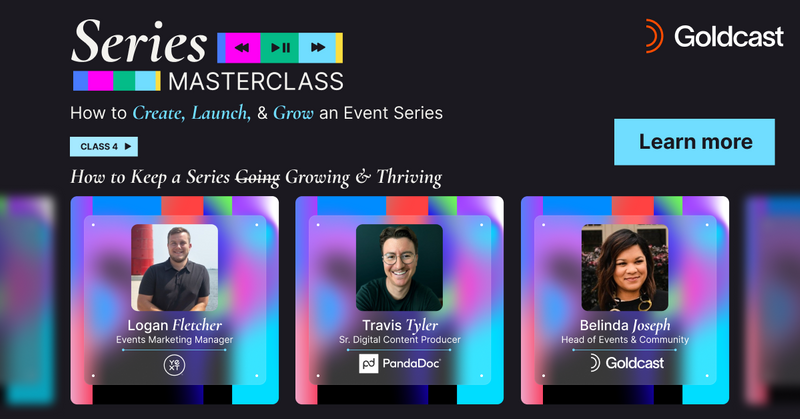
9. Promote your series
Folks won’t know how amazing your upcoming series is if you don’t tell them about it. You’ll need a multi-channel event marketing plan including email, social media, ads, event website, and more.
Here are some of our top event promo tips:
- Live stream your event
- Generate buzz with event gamification
- Inject personality with memes and GIFs
- Offer influencers complimentary tickets
- Use employees’ networks
- Make event registration as easy as possible
In addition, a promotional giveaway never goes out of style. At Goldcast, we’re giving away a home studio recording kit to one lucky attendee who tunes into two or more events in our masterclass series, How to Create, Launch & Grow an Event Series.
10. Put your run of show together
As an event marketer, you know how stressful it can be to manage an event’s moving parts in real time. That’s where your run of show document comes in.
The run of show contains a minute-by-minute breakdown of everything taking place during your event. Include details like:
- Sessions and segments of your event, including durations
- Talking points for your hosts and speakers
- Instructions for the backstage crew and moderators
- Any other relevant notes
Your run of show keeps everyone on the same page and helps your team of event organizers quickly solve challenges, even when you’ve got several other balls in the air.
Want an even more in-depth rundown on planning and executing an incredible event series? Catch all the episodes of our Series Masterclass: How to Create, Launch & Grow an Event Series on-demand now!
Examples of popular B2B event series
Looking for a little inspo before starting your own planning process? Here are a few of our favorite event series examples from the B2B world.
Dreamforce by Salesforce
Salesforce’s Dreamforce hybrid event is billed as “the largest AI event of the year.” This giant event recently had nearly 1,700 sessions targeted to the various roles that use Salesforce’s expansive software.
Post-event, anyone can sign up for a Trailblazer account to watch content on demand, browsing by topic, role, or industry.
Microsoft Ignite
In 2021, Microsoft transitioned its Ignite event to a digital-first event experience with both live and on-demand presentations. As a major industry leader, Microsoft’s series is all about the tech industry’s latest challenges and innovations.
Hot topics from the most recent event include AI and security, as well as sessions centered on Microsoft’s cornerstone products like Azure and Teams.
Forbes CMO Network Summit
Forbes took its CMO Summit series virtual in 2021. This change left an emphasis on the digital aspect of future events: The 2023 sessions are available on demand to Forbes members.
The theme tying this series together is its lineup of marketing executives from a wide range of brands—CMOs, Chief Brand Officers, SVPs of Marketing, and more. Each panel discussed a different topic of interest to marketers, like revenue diversification, creativity, and trust.
Validere’s monthly educational webinars
Validere’s webinar program includes two monthly events covering the top trends in energy and data management. These sessions are targeted specifically toward their niche audience, focusing on topics like carbon reduction and operational efficiency.
A key goal behind Validere’s series is to educate their audience and create awareness for the problem they solve. “Part of our effort is educating our audience that they have a problem to begin with—it's quite a new space we're in,” explained Tamara Teofanovic, Demand Generation Manager at Validere.
Drift’s monthly webinar series
Drift has seen great success scaling their event program in the past few years. The team has created several event series for customers and prospects, including demo days, product deep dives, and user trainings.
The key to this scalability is finding recurring event formats that can be easily replicated: “Scaling up your webinar series is so much easier when you can copy and paste, change the dates and times, and keep the same format,” explains Sara Lieber, Senior Event Marketing Manager.
Clari’s demo event series
Clari runs a similar bi-weekly live demo series. Customers and prospects have an open invitation to drop in and see the platform in action. These engaging, informal sessions are a perfect opportunity to build relationships with their audience.
“For our demo-based series, we leveraged the chat and Q&A within the chat,” recalls Laura Wille, Director of Growth Marketing. “The ability to ‘like’ and use emojis was so much fun and another thing that not all event platforms have.”
Elevate your event series with Goldcast
Planning a series is an excellent next step to take your event marketing strategy to the next level. It can help your brand rise above the crowd and develop affinity with your audience.
Pulling it off, however, takes some forethought and finesse. Our event aficionados at Goldcast tell all, from strategies to lessons learned, including:
💡 Why every department should run their own ongoing series
💡 Strategies for picking, developing, and launching a series
💡 How to keep a series going by sourcing the best guests and content
💡 Ways to measure success and build momentum
Soak it all in by watching our Series Masterclass, How to Create, Launch, & Grow an Event Series. Or, to see firsthand how you can plan a stellar event series with Goldcast, schedule a no-commitment demo.

Transform Your Video Marketing with AI
Stay In Touch
Platform
Resources
© 2026 Copyright Goldcast, Inc. All rights reserved.



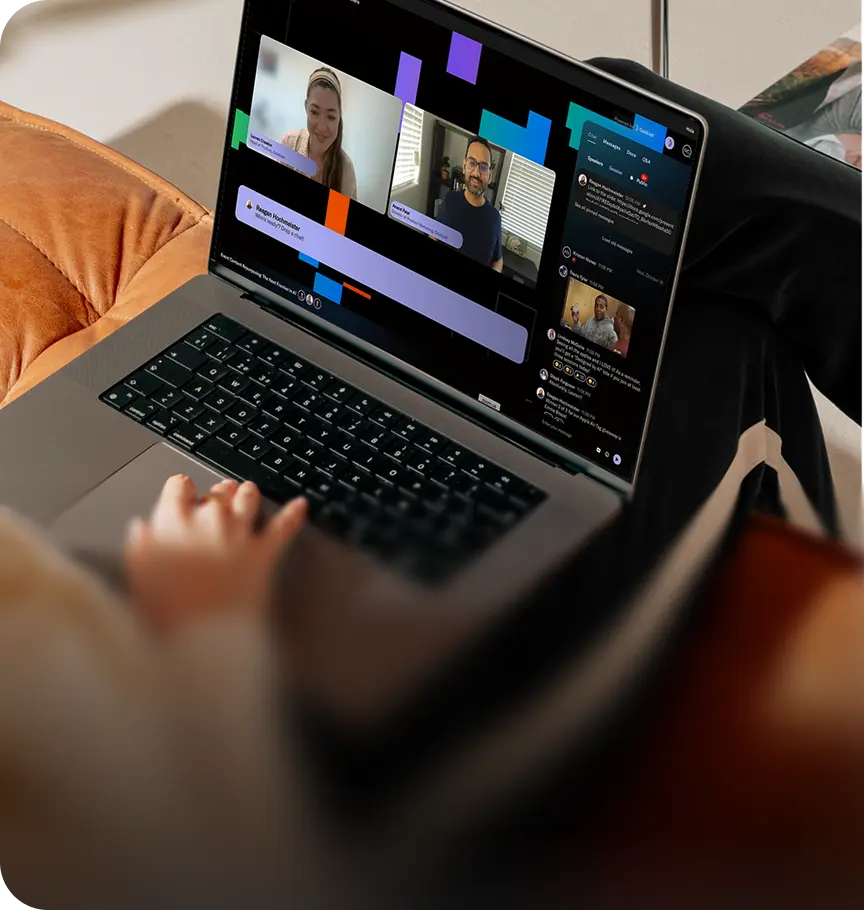

 Upcoming Events
Upcoming Events Event Series
Event Series On-Demand Events
On-Demand Events